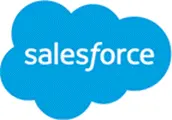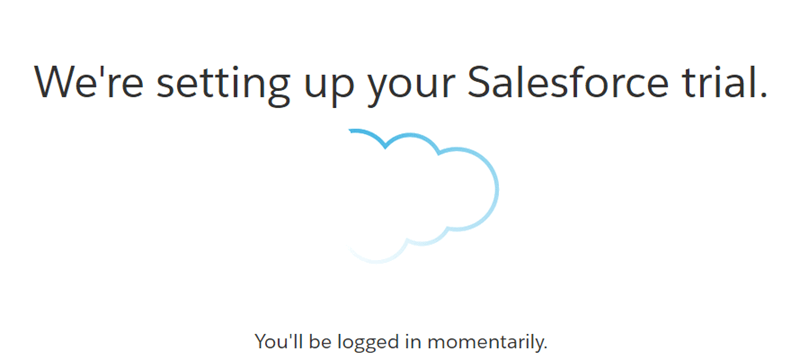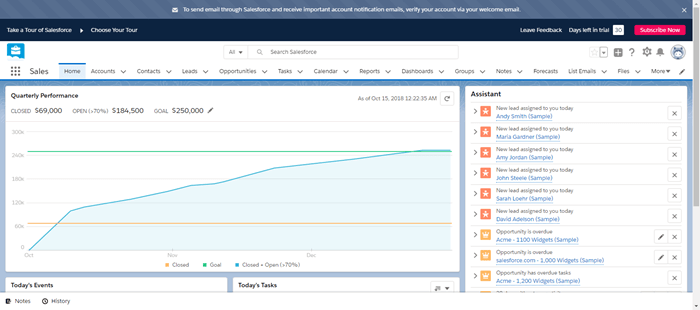Salesforce Tutorial
Before we start learning Salesforce tutorial, lets understand-
What is Cloud Computing?
Cloud computing is all about using a remote server, to store, manage, and process data, instead of a local server/ personal computer.
What is CRM?
CRM (Customer Relationship Management) is a kind of software that stores customer contact information like name, address, age, phone number. It also keeps tracks of customer activity like website visits, numbers of outgoing and incoming phone calls, email, and more.
What is Salesforce?
Salesforce is a cloud-based Customer Relationship Management (CRM) software for managing customer relationships and integration with other systems. This SaaS tool helps to create custom solutions for marketing, sales, services and ecommerce as per business requirements. Salesforce has now expanded from just CRM to offer multiple products.
Salesforce CRM is built on a platform development language called APEX. Salesforce testing allows you to check that the configuration and code are functional. This CRM allowed me to improve customer loyalty, retention, and satisfaction, aiming to build lasting connections.
History of Salesforce
- It was founded in March 1999 by ex-Oracle employee Marc Benioff, Frank Dominguez, and Parker Harris
- In June 2004, the company’s IPO was listed on the New York Stock Exchange under the stock symbol CRM and raised US$110 million.
- In October 2014, Salesforce announced the development of its Customer Success Platform to merge all the Salesforce’s services like sales, service, marketing, analytics, etc.
- In 2017, Sales force launched a Facebook Analytics tool.
- In 2018, Sales force partnered with Apple for improving apps for businesses.
- Salesforce.com translated its services into 16 different languages. It currently has 82,400 regular customers and over 2,100,000 subscribers.
Why Salesforce? Key Benefits
Here, are prime reasons for using Salesforce CRM:
- It is a complete feature-rich solution for marketing, sales, service, partner management, and community management.
- Salesforce data is stored in the cloud so your team can use it from anywhere in the world with the help of an Internet connection.
- It caters to the needs of small as well as medium to large organizations.
- Salesforce works on a pay as you go, model so there are no overhead costs.
- Increase customer loyalty, retention, and satisfaction
- Accelerates sales productivity
- Salesforce can easily integrate with 3rd party apps.
- Increase the growth of your business
- Continuous optimization of campaigns can be done based on the market response and closure interaction with channel partners.
Salesforce Architecture
The below figure demonstrates detailed Salesforce Architecture:

The architecture of Salesforce can be divided into various components described as follows:
Trusted multitenant Cloud
In this component, multiple instances of one or more application operate separately in a shared environment. The instances are known as tenants which separate from each other. Although, there are physically remain in the same hardware. It is called trusted as it offers a high level of security.
Scalable Metadata Platform
This component helps you to customizations. It also allows you to increase the amount of data or concurrent user instances.
Enterprise Ecosystem
The enterprise Ecosystem of Salesforce is quite big as many partners contribute by creating and maintaining in this platform. To ensure the quality of your Salesforce implementation, it’s essential to learn about Salesforce testing techniques and best practices.
APIs
Salesforce offers a powerful suite of APIs to develop the Mobile App.
CRM and Related Functionality
Salesforce includes all features of CRM and also offers features for the creation of apps
Service Nature of Salesforce
- Salesforce as SaaS (Software as a Service): No installations, setup or download required. Just Log in and use software across the Cloud.
- Salesforce as PaaS (Platform as a service): In this kind of software service, no separate platform is required. You can use the developer’s code to create and deploy applications.
- Salesforce as laaS (Infrastructure as a service): No hardware or software installations needed as your data and applications are stored securely on the Salesforce cloud.
Features of Salesforce
- Marketing and sales lead: Helps you to measure customer engagement by tracking email activities and convert them to customers.
- Contact management: With the help of this feature you can pull your customer’s data like activity history, frequent contacts, customer communications, etc.
- Opportunities and quotes: Helps vendor to create opportunity and quote.
- Build and run innovative apps: You can build, scale and manage apps
- Analytics: It allows you to access the data, create dashboards and perform analysis
- Email integration: It provides integrations devoted to customer service, support and customer experience
- Communities for sales:– Online community software that enables companies to connect customers, partners and employees with each other
- Salesforce Engine: This feature focuses on making personalized contact with a customer for various campaigns designed by the marketing team
- Sales Collaboration: This feature helps you to address customer queries and feedback
- Sales Performance Management: It offers a metric-based goal setting and helps you to get feedback & rewards for the sales team.
- Lead Management: This feature helps you to tracks the leads that are in progress
- Territory Management: This feature allows you to create multiple territory models. You can also preview them before rollout, and helps you to optimize and balance territories
- Partnership management: This feature allows you to build communities with partners and help them to share objectives, goals, and activities
- Workflow and Approvals: The interface provides simple drag and drops option
- Files Sync and Share: This feature provide the sales team the power to share various files and update them instantly
- Reports and Dashboards: Dashboards and reporting feature offers a real-time picture of the business at a glance
- Sales Forecasting: This feature allows you are getting a real time view of the forecast of a sales team
Salesforce Products
| Type of Cloud | Description |
|---|---|
| Sales Cloud | Salesforce cloud brings all the customer information together in an integrated platform. It includes various features for marketing, sales, and lead generation which helps you to achieve your business goals. |
| Market Cloud | Marketing Cloud helps you to monitor and engage with the customer across the world. |
| Service Cloud | With service cloud, 4000 service agents solve over 10 million cases each year. |
| Analytics Cloud | Analytics cloud is helping companies to visualize data. |
| Community Cloud | Using a community cloud company can directly connect with resellers, distributors, and partners. |
| Commerce Cloud | The commerce cloud allows your organization to provide seamless customer service and experience. |
| IoT Cloud | The IoT cloud is used by the company’s to develop connected products. |
| Health Cloud | Health cloud is helping the health industry to understand patients beyond their charts. |
Difference between Traditional CRM Vs. Salesforce CRM

| Traditional CRM | Salesforce CRM |
|---|---|
| Hosted on the company’s server | Hosted on the cloud |
| Takes months or even years to set up | Can be set up in a few days or weeks |
| Difficult to understand and use | Easy to use and understand |
| Unused data | Manages all data in one place |
| No personalized service | Real-time customer data and personalized service |
| High client attrition | High customer lifetime value |
How are companies using Salesforce?
Now in this Salesforce CRM tutorial, we will learn how Salesforce is used by the companies for various applications:
| Industry | Company | Usage |
|---|---|---|
| Communications | Comcast-Spectator | Salesforce CRM helps them to maintain detailed customer profiles to find out their biggest fans to developer an effective marketing technique. |
| Finance | American Express | American Express using a CRM tool to connects their employees across organizations, branches, and time zones. |
| High Tech | Sony | The famous broadcasting firm sony use the Salesforce service cloud to communicate with its customers. |
| Health Care | Health Leads | Health Leads able to view, update patient data and coordinate with doctors. |
| Media | Coco-Cola | Coco cola the cold drink maker uses salesforce to connect better with their staff and people. |
How to access Salesforce?
Now in this Salesforce tutorial, let’s learn how to access Salesforce:
Salesforce has a 30-day free trial and we will register for the same.
Step 1) Go to link and
1. Add required information
2. Click on start free trial button
Step 2) Setup will take time
Step 3) You will see the welcome screen, with demo data
Step 4) Let’s create a new Account (Company). Click on Account > New
Step 5) In the popup
- Enter the required data
- Click save
Step 6) Account is created
The UI of Salesforce very self-explanatory and likewise you can do other transactions.
What is APEX?
Apex is an object-oriented programming language. It allows developers to execute transaction control and flow statements on Salesforce servers with the help of an API. Apex also helps developers to add business logic into their programming code.
Here, are advantages of using Apex language:
- Apex uses syntax and semantics that are easy to understand and offers fast and effective results
- It is designed to thread together multiple queries and DML statements into a single unit of work on the Salesforce server
- Apex uses direct references to schema objects like object and field names
Summary
- Cloud computing is all about using a remote server, to store, manage, and process data, instead of a local server/ personal computer
- CRM is a kind of software that stores customer contact information like name, address, age, phone number
- Salesforce introduction: Salesforce is a Software as a Service (SaaS) CRM which helps you to manage customer relationships, integrate with other systems, and even build your apps
- Salesforce was founded in March 1999 by ex-Oracle employee Marc Benioff, Frank Dominguez, and Parker Harris
- It is a complete feature-rich solution for marketing, sales, service, partner management, and community management
- Trusted Multitenant Cloud, Scalable Metadata Platform, Enterprise Ecosystem, APIs, CRM, and Related Functionality are important salesforce components
- The service nature of Salesforce are SaaS, PaaS, and laaS
- Marketing and sales lead feature of salesforce helps you to measure customer engagement by tracking email activities and convert them to customers
- Important salesforce tools are: Sales Cloud, Market Cloud, Service Cloud, Analytics Cloud, Community Cloud, Commerce Cloud, IoT Cloud, and Health Cloud
- Traditional CRM hosted on the company’s serve while Salesforce CRM is hosted on the cloud
- Salesforce used in various Industries like Communications, Finance, High Tech, Health Care, Media, etc.
- Apex is an object-oriented programming language which allows developers to execute transaction control and flow statements on Salesforce servers








